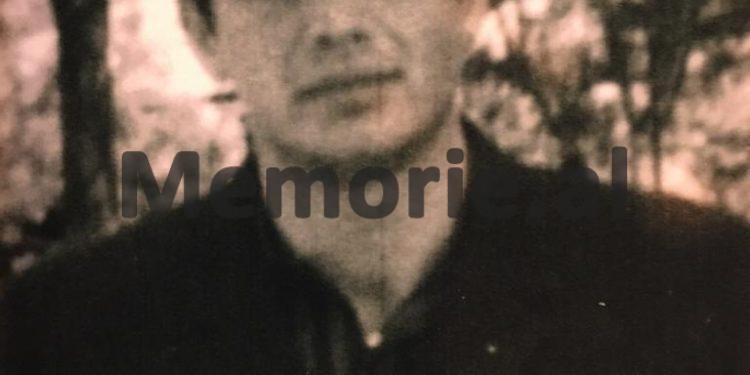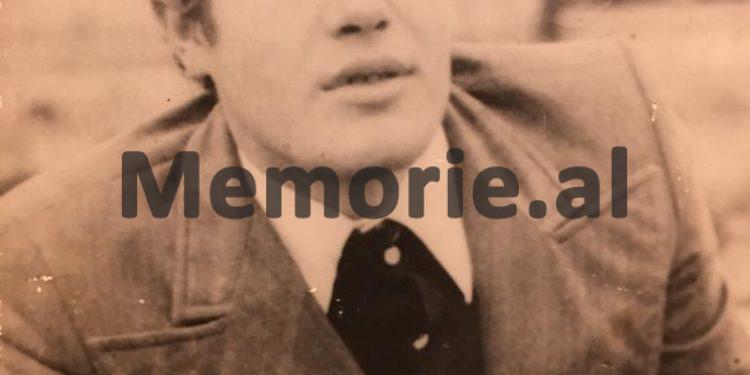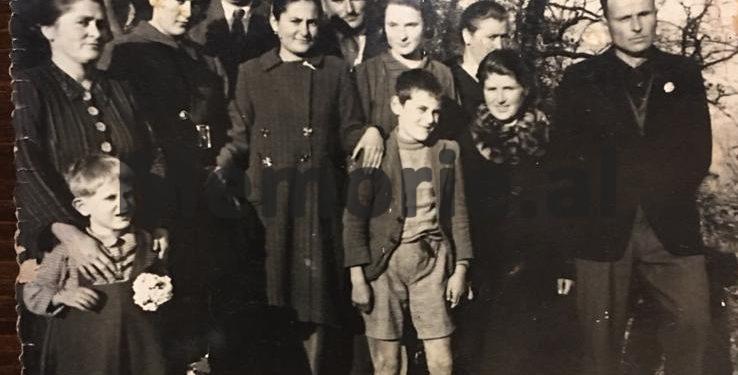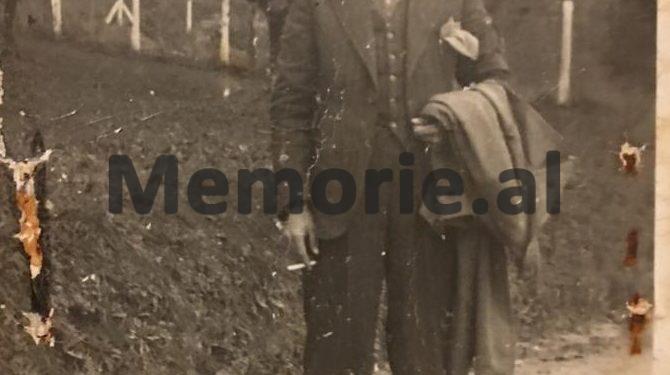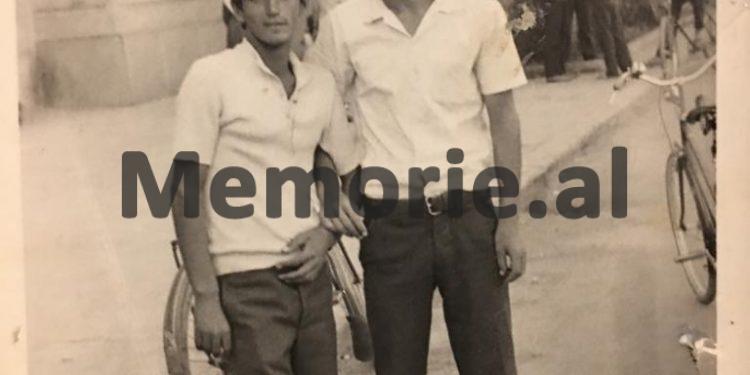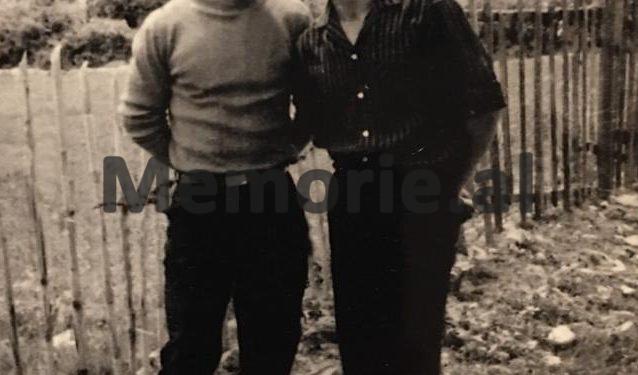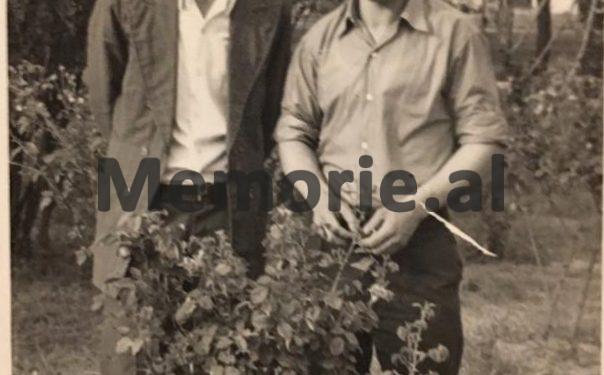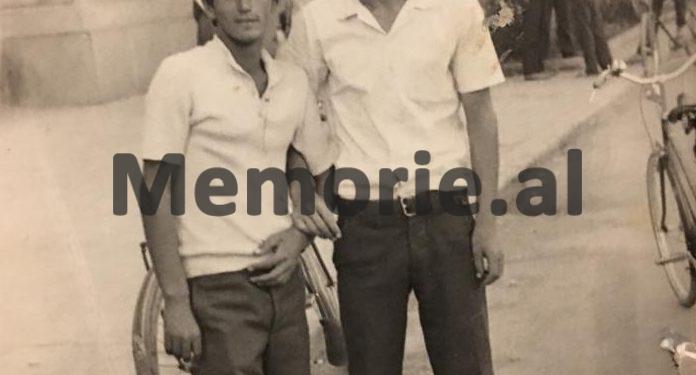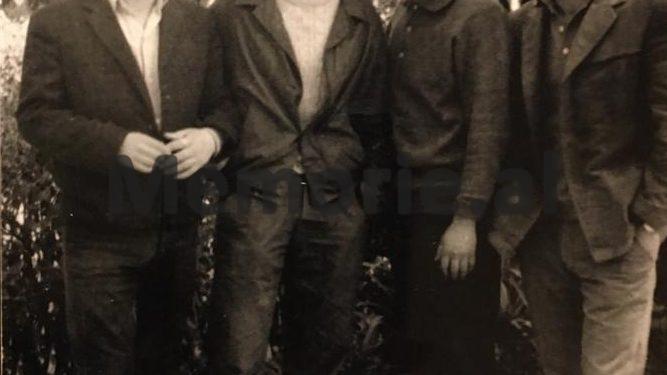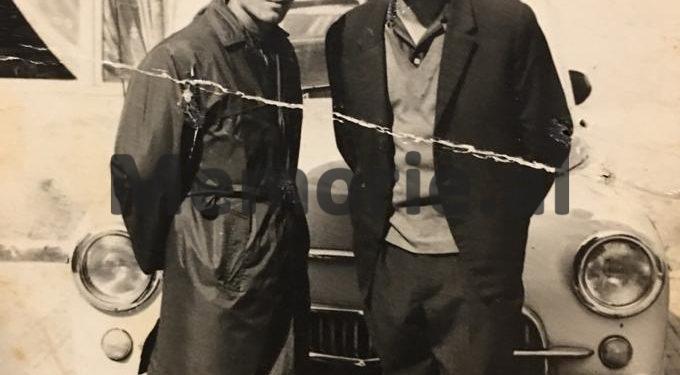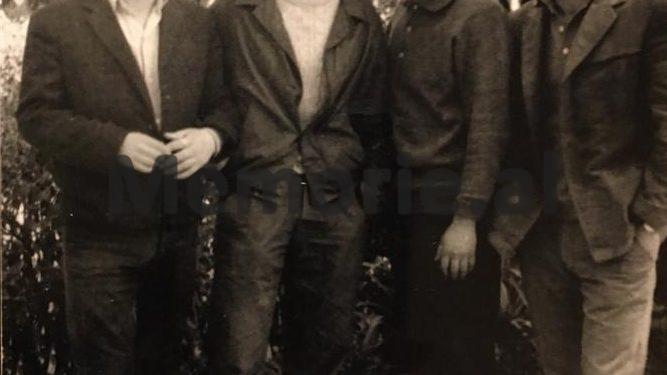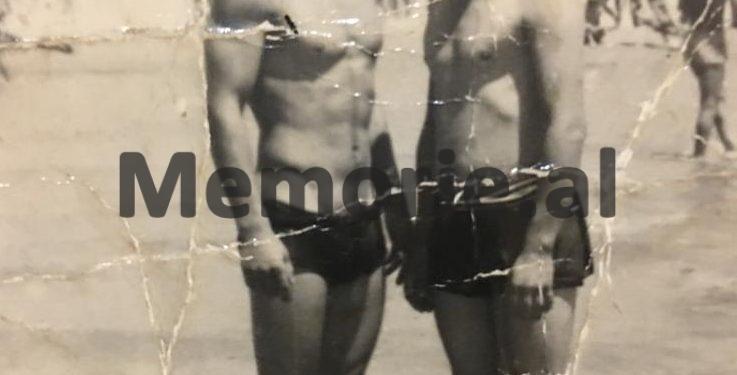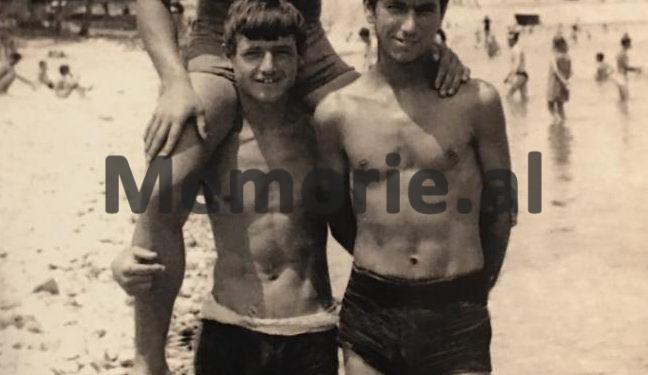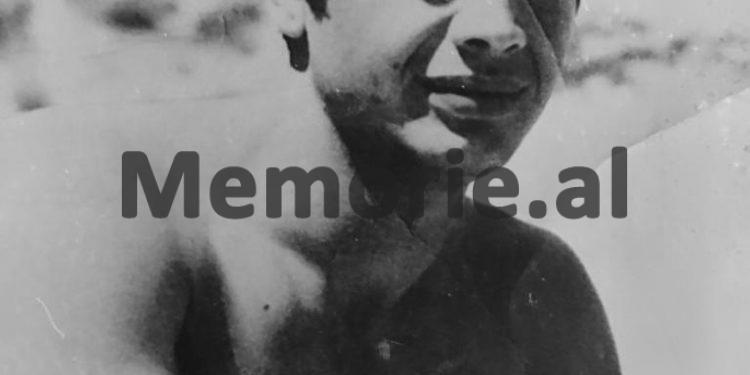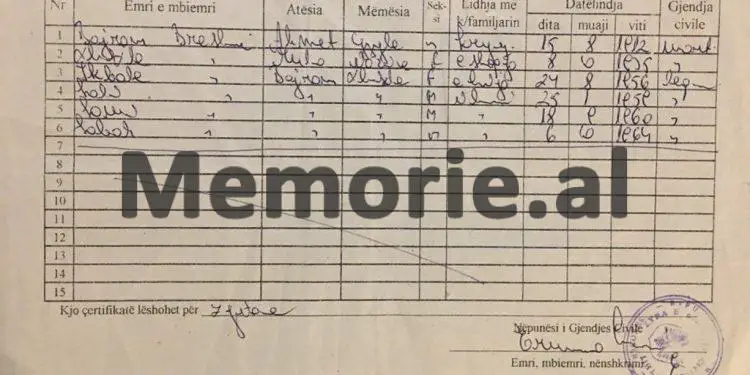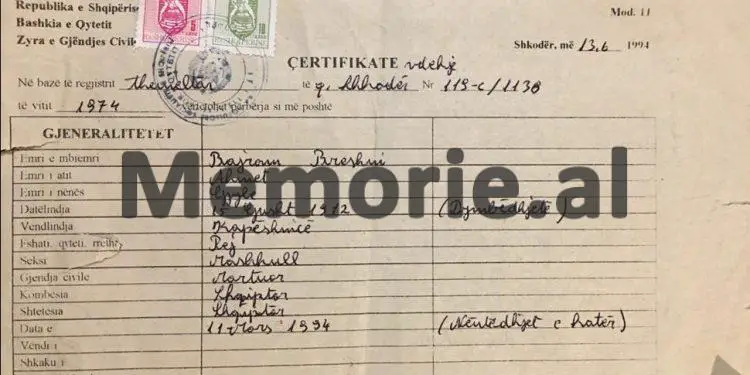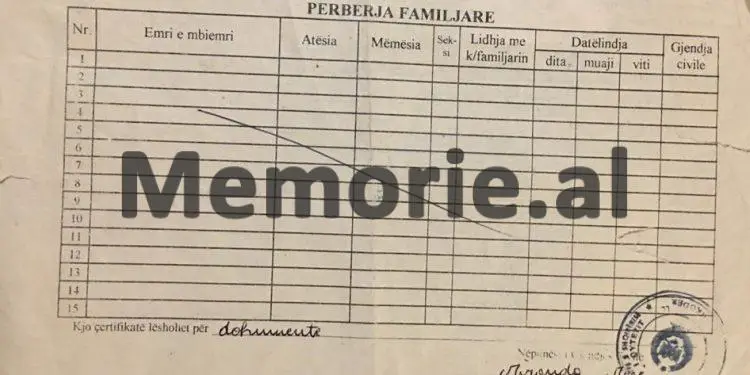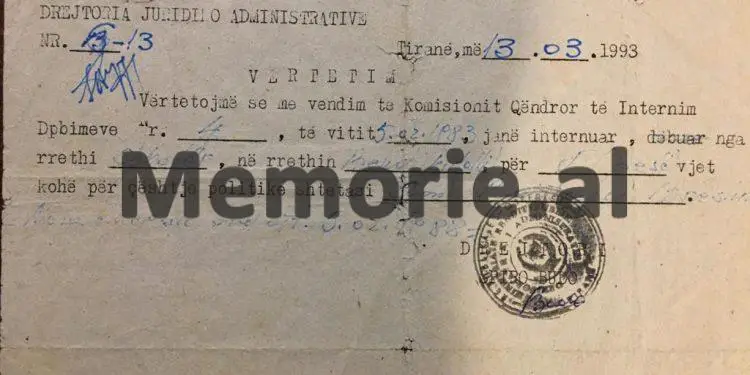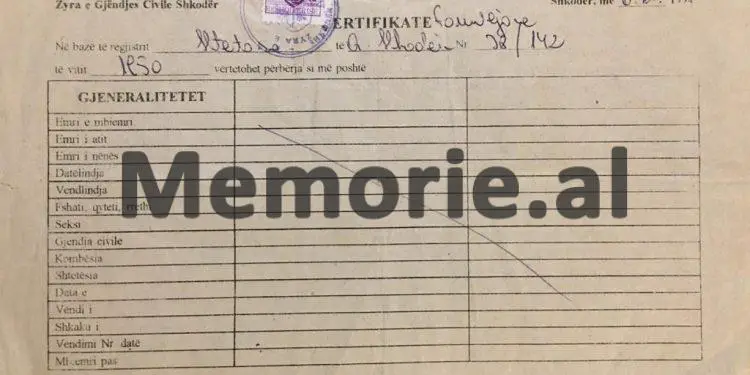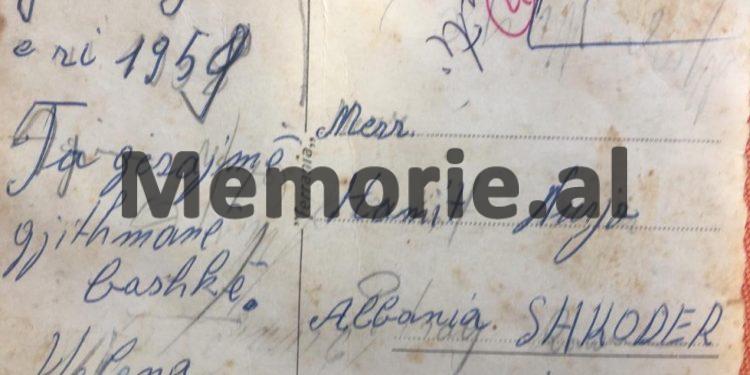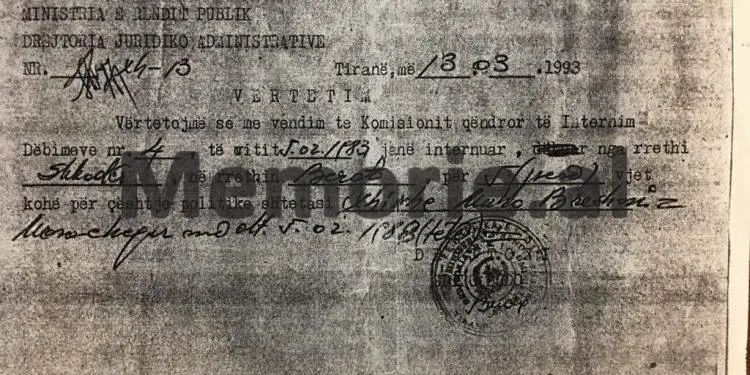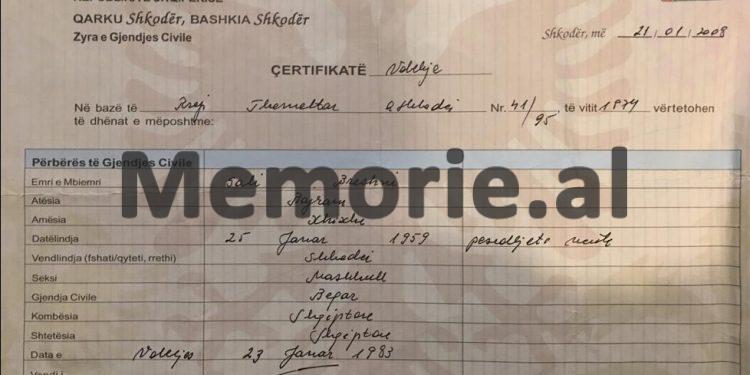Dashnor Kaloçi
Memorie.al publishes the unknown story that took place in the city of Shkodra on January 23, 1983, when two young men, Fatmir Gusha and Sali Breshni, after abducting three Kalashnikov automatic weapons and several cartridges, in one of the wards was located in the village of Shtoj, they headed towards the city unscathed from the man to the Military Branch, where after being dictated and clashed with an officer, they started firing in the air as a sign of pressure.
Their departure, to go to the Internal Affairs Branch, was spotted by the police forces and they were forced to stay in an alley behind the Pedagogical Institute, “Luigj Gurakuqi”, where they entered and were locked in the house of the Hysej family, where they were surrounded by numerous forces of the Shkodra Police and the Military Division, as well as Special Forces (Ward 326) coming from Tirana.
The whole event, according to the rare testimony of the former Chairman of the Internal Affairs Branch of the city of Shkodra, Përparim Xhoxhaj, is published for the first time by Memorie.al, since from the evening of January 23, 1983 until today, everything has remained silent covering with mystery the event that shook not only the city of Shkodra, but also the senior leadership in Tirana, after Ramiz Alia urgently sent to Shkodra the Minister of Internal Affairs, Hekuran Isai, the General Director of the State Police , Kasem Kaçi and all night they were kept surrounded and until the morning, when they were physically eliminated, demolishing the house with a tank and shooting them with grenades, Ramiz was in contact with them, giving orders, opinions and suggestions .
Who was Fatmir Gusha who in the city of Shkodra was also known by the nickname, “Caf Susta”, and Sali Breshni, what problems did they and their families have with the communist regime in power and what was their goal after taking up arms in the ward and why they refused to surrender even after the police forces and personally, the General Director Kasem Kaçi, sent Fatmir’s 13-year-old son, who was being taught by the Branch officers, urging his father to be dosed… ?!
Testimony of Përparim Xhoxhaj, and the Gusha family, Mit’hati (Fatmir’s brother), Fatmir’s son Bardh, who was taken hostage by the police for “negotiations”, with his father, as well as some friends of “Caf Susta”, with their stories for the first-time shed light on this event, for 37 years their bones have not yet been found even though family members have not stopped searching?!
It was the evening of January 23, 1983, when the calm in the city of Shkodra was disturbed by several gunshots and sirens of police vehicles which were heading towards the city center, in the area near the Pedagogical Institute “Luigj Gurakuqi”. These caused panic and fear throughout the city, where it was said that: “an armed gang had come from Yugoslavia, going to the center of the city without being noticed by anyone, where they were surrounded by police, army and forces Specials from Tirana, who were fighting against them and they did not surrender”?!
All these, as well as various versions of what was happening that evening of January 23, 1983 in the city of Shkodra, would continue to be “bought” in parallel with what was really happening right behind the Pedagogical Institute at home. of the Hysejs, the truth would be known only on the morning of January 24, shortly after the guns had ceased and the police sirens were no longer heard.
That morning all over Shkodra the news broke that the two people who had been trapped in the house of the Hysejs had fought all night against the police forces and those of the army who kept them surrounded, had been Fatmir Gusha, (otherwise known by the nickname Caf Susta) and Sali Breshni, a friend of his. After they refused to surrender, they were physically eliminated by grenades and a small tank of the Shkodra Division, destroyed their house and trapped them inside.
Regarding this event that took place 37 years ago in the city of Shkodra, which was kept secret by the communist regime and has never been made public, Memoria.al publishes the first part of the interview with the former Chairman of the Internal Affairs Branch of Shkodra, Mr. Përparim Xhoxhaj, which he gave us a few years ago.
Mr. Xhoxhaj, how do you remember the event of January 23, 1983 and did you know the two young people from Shkodra before, Fatmir Gusha (otherwise known as Caf Susta) and Sali Breshni?
I met the late Fatmir Gusha or as he is otherwise known as Caf Susta, I met him for the first time three – four days before that event where he was killed. And I did not know the other one, his friend, Sali Breshni.
Specifically, under what circumstances did you know Fatmir…?
I, as the Branch President, met the people every Monday, when there were people who had any urgent problems or issues, I met them and waited for them in the office at any time. One of these out-of-the-ordinary receptions was what I did to Fatmir and his wife in my office. They asked for an appointment and I waited for them. In fact, Cafi, as he was called for short, had divorced his wife, which had become false, so that she and her children would not suffer the measure of exile, which had been given to Cafi by a court decision for the problems he had, a sentence he was serving in the village of Hajmel in Shkodra.
Specifically, for what was Cafi sentenced to exile?
I do not remember well, as he had been convicted several times for open crimes as we called them in professional terms, and in popular jargon, they were called “ordinary crimes”. If I am not mistaken, Fatmir had opposed the police or physically confronted them by defending another person, his friend probably, whom they wanted to arrest by the police forces after a disturbance in one of the most famous locals of the city of Shkodra… I do not remember well in detail, but basically this was one of the events that led to Fatmir’s sentencing and deportation.
How was your meeting with Caf and his wife?
Cafi was standing a little behind his wife and I could see he was shaking, he was extremely psychologically charged and his anger was clearly visible, but he did not speak at all. I thought he; was drunk, in a word seemed unfocused and a bit like depressive. His wife, who has been a very good woman, told me: “Comrade President, if there is a possibility, my husband has one more year left to suffer the exile, so you can forgive the rest and he to return home, as we have aunts and three children to raise”.
How did you respond to her request?
I told him that: according to the laws in force, it was not within my competence to pardon the sentence, and I immediately contacted them directly on the phone, with the person covering the enforcement of the law (his name was Adil, I do not remember the last name), who told me that it could only be done by court order. After that I called the President of the Court of Shkodra, Mërgim Dragushën and said the same words. Mergim told me he would look into that problem. After that, Cafi’s wife told me to postpone for a few days the permission given to him (Cafi) to leave the place of internment, because he had been to the hospital where he was donating blood (he received 3 thousand ALL old) and stay a few days with the children.
Did you fulfill their request?
I reconnected on the phone with the person covering the legality (Adil) and told him to postpone his permission. He told me that he had spoken on the phone with doctor S. A., and he had told him that: Cafi had been given a letter of admission to the hospital in Tirana, and that he should be allowed to go to Tirana to be admitted. I told him to postpone his leave from the place of internment, as I was the guarantor with my signature, and after he returned from the hospital, Cafi came to see us at the Branch. After that, Cafi and his wife were very pleased and thanked me a lot. So, I parted with them, if I am not mistaken it was Thursday and after three days, probably Saturday dawning Sunday, the event took place where he and his friend, Sali Breshni were killed.
How do you remember that event?
That afternoon, from 6:30 pm, if I am not mistaken, I was going to my office in the Internal Affairs Branch together with Qemal Lama, the Chief Investigator of the Republic, who had come from Tirana to pursue a work problem of his line. As soon as I entered the office the phone rang and I picked it up immediately. A voice of a very shocked man (whom I never learned who he was) said to me: “What are you doing in the Branch, people are being killed here”?! Where, I asked?! “Here, after the Institute,” he explained. Immediately I went out the window and heard automatic weapon shots with prolonged bursts.
What did you do after what you heard?
I left Qemali in the office and went downstairs, immediately heading to the scene, where 6 or 7 policemen had arrived in front of me, who had gone there on their own initiative, after hearing the shooting. The shooters had forced their way into a house behind the Faculty building (today’s University) where the Hysaj family lived (the owner of the house was called Agim Hysaj) and fired incessantly from the windows of that house.
What was specifically happening there and how was that event commented on by the people of Shkodra?
Apart from the gunshots and bursts of gunfire that could be clearly heard and seen, initially nothing was known more and based on this, the event that was happening was commented on and interpreted in various ways. But what dominated all the versions, or rather the speculations circulating throughout the city, was that: “Some armed people from Yugoslavia have entered a house and are fighting with the police, army and other forces. reservist volunteers, who have surrounded them on all four sides”. In addition to these words and rumors circulating, the event became more tragic and panic increased when it was learned that two people had been killed.
Who were they and under what circumstances were they killed?!
One was an elderly man named Sul Dashi, who was said to have been shot dead in front of his house, and a 13-year-old boy who died shortly afterwards in hospital from a gunshot wound…
When did you learn that those who were surrounded there and shot were Fatmir Gusha and Sali Breshni?
There we learned it at the scene, as Cafi and Sali, before entering there, had entered another house before, more precisely the house of Kolec Thani (brother of the famous actress, Tinka Kurti), where he had had a dinner family and there were other guests as well. After staying for a while at Kolec Thani’s house, they left there and went out on the street, for fear of confronting the police, they were forced to enter Hysaj’s house.
Did you know how many people there were?
Initially we knew that there were three people in that house, because from the military unit where they had taken the weapons, we were informed that three “Kalashnikov” weapons and 37 cartridges with bullets were missing.
Where did Cafi and Sali get their weapons in which military unit and how did they learn from the police?
They had taken the weapons in a reconnaissance unit, located in the village of Shtoj in Shkodra, where some time ago he had completed his military service, Sali Breshni, who had not yet completed his military service, after being convicted of fleeing without permission… He, knowing the unit well, had been able to enter there with Cafi, exactly that afternoon when the guard officer had fled home, the non-commissioned officer had left and after them almost all the soldiers had left. Taking advantage of this situation, Cafi and Saliu had taken three Kalashnikov rifles and 37 cartridges of ammunition, which they had put in the soldiers’ pillow case.
But after they managed to get the guns and cartridges with bullets, where did they move?
After that, quite calmly, they came in the direction of the city of Shkodra to the Military Branch, where they realized that they were armed and started firing in the air. (These things we learned later, in the analyzes we did in the Branch).
How were they understood, so who found them armed?
The first to see the two gunmen was the wife of an officer, who was staying at the palace in front of the Military Branch.
Specifically, how…?
The two of them, (man and woman), had started going on a family visit and the woman, while waiting for her husband to come down to the palace, climbed the scared stairs, telling him that there were two-armed people down there. The officer told his wife that they should belong to the Military Branch, but she told him that they did not look like that, as they were perverted.
How had the officer acted after that?
Then the officer went out to the window of the house and said to them: “Ore, what are you, and what are you looking for there?” They insulted or threatened the officer, telling him to get inside, otherwise they would kill him and immediately fired a gun into the air with volleys. So, this is where they were first understood, or more precisely, this is where they started firing in the air, this is what they did all the way to the house of the Hysajs, behind the Institute, a road which is around 600-700 meters.
Going back to the event that was happening, to the house where they were surrounded, was Tirana informed about what was happening there and how the event continued?
Of course, the announcement was made in Tirana in a matter of minutes and I, as the head of the Branch leading the operation to capture them, communicated several times by phone with both Ramiz Aline and the Minister of Interior, Hekuran Isain, who left immediately from Tirana and came and settled in the Reception House in Velipoja.
What did they tell you and why did Hekuran Isai stay in Velipoja and not come to the scene?
Ramiz, who at that time was the Speaker of the People’s Assembly, asked about the event and also Hekuran, but they could not give instructions, because everything depended on the situations that occur there. Why Hekurani stayed in Velipoja, I cannot say exactly, because he thought so, but the General Director of the State Police, Kasem Kaçi, came to the scene, who stayed with me all night and until morning. directing the operation. So, as it were, from the task that Kasemi had, he was the one who commanded me as well.
Was it normal in such an event, when the top leadership was alarmed, e.g. Ramiz Alia, as you said and you who communicated with him, the Minister of Internal Affairs to stay in Velipoja…?! Or was he afraid to come from where it was said that they had come from Yugoslavia…?!
To be honest, we cannot call it normal, but I am showing you the dynamics of the event, how it happened, that if we enter the analysis, how and why it was done that way, or so it happened, we never end the conversation…?!
We return to the event. You said that the Director of the State Police, Kasem Kaçi, was the one who led the Operation and not you?! Or the legal side, so was it determined who should lead the operation in such an event?
I cannot tell them exactly what our law and regulations provided, but I was subordinate to him, ie the General Director of the State Police, and normally I had to carry out his orders and orders, especially when I said that he was connected and received orders from Minister Hekuran Isai and Ramiz Alia in Tirana.
What about other forces besides those of the police that you had in the Internal Affairs Branch, and other senior cadres, did they come to your aid or reinforcement?
Yes, some people came from Tirana who accompanied Kasem Kaçi, and besides them, there also came the special effective forces of Ward 326, or as they were otherwise known as sampists, as that ward was created for such events, even though they were rare, not to mention at all. Before those special forces came from Tirana, after the alarm that was given to the whole district of Shkodra, there came some military and volunteer (reserve) forces of the Shkodra Division, which were under the command of the Commander (Llukan Garo) and Commissar (Dedë Gjergji), of that Division, who were staying in my office in the Internal Affairs Branch.
How many of those forces were there and who commanded them?
I do not even know today how many of those forces were there as that thing constituted a military secret nor did anyone dare to ask after you were arrested immediately, whoever you were. While all those forces, in every action that took place there, were under my command, as I led the operation directly to the scene and from the Inner Branch, making marches (Branch – scene) dozens of times. While I, as I told you, was commanding and acting under the orders of the General Director of the State Police, Kasem Kaçi, who actually led the operation./Memorie.al
Continues in the next issue




